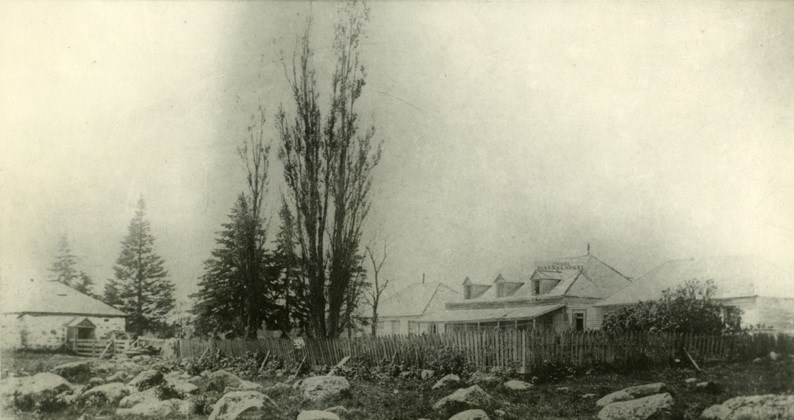From the archives of the Sault Ste. Marie Public Library:
When you think about Sault Ste. Marie in the 1850s, odds are you’re thinking about the fur trade and the Hudson’s Bay Company. But would you expect accusations of abduction levelled against some of the Sault’s most prominent citizens?
It was 1856, at the Hudson’s Bay Company Sault Ste. Marie fort. The key players included some notable people from the city’s history.
First was Wemyss Simpson. Simpson was serving as the factor for the Hudson’s Bay Company in Sault Ste. Marie. He would later become the postmaster for the Sault and become Algoma’s first MP in the House of Commons — his contributions were so significant that Simpson, Upton, and Wemyss Streets were all named after him.
At this point, though, his work centred on the fur trade and the Hudson’s Bay Company; he was managing the fort here.
Next was Joseph Wilson, another influential person from the Sault’s history with a long list of responsibilities. He worked as the Collector of Customs for the Port of Sault Ste. Marie, the Custom House Officer, the Crown Land Agent, and the Postmaster. And, on top of these duties, he had just been appointed as Magistrate.
All told, he effectively ran Sault Ste. Marie.
Finally was Benjamin Coutts, an employee of the Hudson’s Bay Company. According to the Archives of Manitoba’s Name Indexes, he was originally from Scotland. He started with the company in 1847 and worked as a slooper: a crewman who worked up on the bay. At some point, however, he wound up living in Sault Ste. Marie.
All accounts agreed on this: that in the summer of 1856, Benjamin Coutts left Sault Ste. Marie, going north by boat. After that, opinions started to diverge. In the following account from The Globe, later to become The Globe & Mail, we get one side of this story.
The Globe brought the event to public attention. In a series of articles, they described how Coutts had been labelled a deserter of the Hudson’s Bay Company. Wilson handcuffed Coutts, presumably by order of Simpson, brought him north by canoe, and handed him over to the Hudson’s Bay Company Gentry in Moose Fort, all without any clear cause.
The first article itself was not particularly scathing — apart from questions about Wilson’s character, to which the writers applied the terms “irresponsible” and “incapable.”
However, when a year passed with no trace of Coutts, The Globe’s articles took a more aggressive turn. They lambasted the government’s lack of response to his disappearance; despite Sault residents signing a request for an investigation into the issue. The government suggested that Benjamin Coutts himself could push for an investigation if he so chose.
The Globe writers also referred to Wilson as a “petty tyrant” and called for his dismissal. They insisted that Simpson “be made to atone” for what had happened to Coutts. They referred to the Hudson’s Bay Company as “despotic.” They even went so far as to say that Coutts had been abducted and “may have been murdered.”
The Globe provided a first-hand account from an officer who was involved in the arrest, backing up their opinion that the arrest was unjust and a terrible violation of rights.
Sault Ste. Marie was under British rule; Moose Factory was part of Rupert’s Land, under the authority of the Hudson’s Bay Company.
Taking Benjamin Coutts north into the wilderness was more than just a canoe-ride: it was more akin to a forcible extradition, according to The Globe, with Coutts “kidnapped and carried out of Canada.”
Perhaps unsurprisingly, Joseph Wilson had a different version of the events that occurred. He said that he did arrest Coutts for breach of contract, a result of him deserting his duties with the Hudson’s Bay Company; he only kept him handcuffed because there was no lock-up house available.
As for Coutts leaving by boat, according to The Globe, Wilson claimed Coutts had left on his own — not through abduction or with any resistance.
Sir John A. Macdonald (then serving as the Premier of the Province of Canada, not yet Prime Minister) weighed in, stating that after examining Wilson’s account of what happened, he thought the only real issue was that Coutts had been handcuffed unjustifiably. He should have been “presumed innocent and treated as such in every respect consistent with his safe keeping,” he wrote in a letter to the Provincial Secretary.
Opinions varied as to whether Coutts was dragged unwillingly into the north or not, and as to whether or not Wilson did anything wrong. What about claims that he was a deserter?
In 1923, the Sault Star reproduced a copy of a Hudson’s Bay Company labourer contract. The contract itself was from 1872, just sixteen years after this case, and paints a picture of the demands placed on employees — and how easily one could be accused of desertion. The contract demanded “the whole of [the employee’s] time and labor,” obedience, absolute loyalty. And the contract required that any intention to quit be expressed a year or more before the expiry of the contract; if he failed to give his one year’s notice, the contract would be extended by an extra year.
So, do some of Sault Ste. Marie’s prominent early citizens have an instance of kidnapping in their past? Or was it a case of the news simply exaggerating a story? With all parties involved long dead, we will probably never know for certain.
Each week, the Sault Ste. Marie Public Library and its Archives provides SooToday readers with a glimpse of the city’s past.
Find out more of what the Public Library has to offer at www.ssmpl.ca and look for more Remember This? columns here
